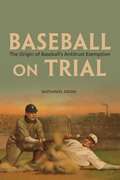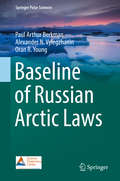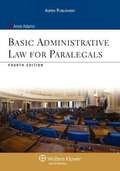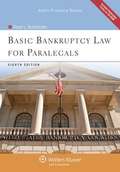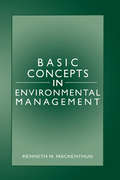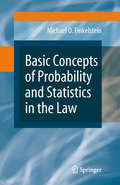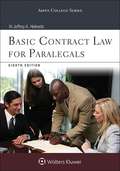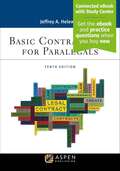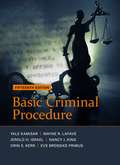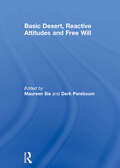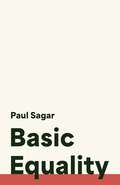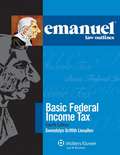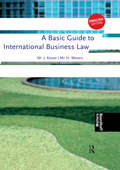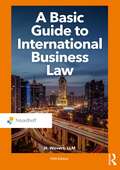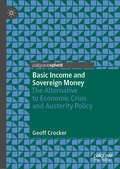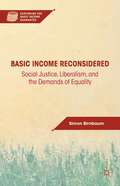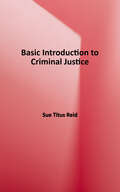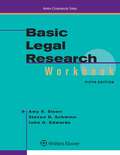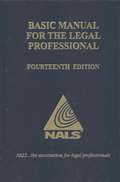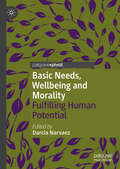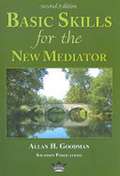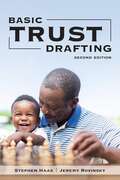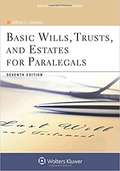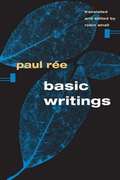- Table View
- List View
Baseball on Trial: The Origin of Baseball's Antitrust Exemption
by Nathaniel GrowThe controversial 1922 Federal Baseball Supreme Court ruling held that the "business of base ball" was not subject to the Sherman Antitrust Act because it did not constitute interstate commerce. In Baseball on Trial, legal scholar Nathaniel Grow defies conventional wisdom to explain why the unanimous Supreme Court opinion authored by Justice Oliver Wendell Holmes, which gave rise to Major League Baseball's exemption from antitrust law, was correct given the circumstances of the time. Currently a billion dollar enterprise, professional baseball teams crisscross the country while the games are broadcast via radio, television, and internet coast to coast. The sheer scope of this activity would seem to embody the phrase "interstate commerce." Yet baseball is the only professional sport--indeed the sole industry--in the United States that currently benefits from a judicially constructed antitrust immunity. How could this be? Drawing upon recently released documents from the National Baseball Hall of Fame, Grow analyzes how the Supreme Court reached this seemingly peculiar result by tracing the Federal Baseball litigation from its roots in 1914 to its resolution in 1922, in the process uncovering significant new details about the proceedings. Grow observes that while interstate commerce was measured at the time by the exchange of tangible goods, baseball teams in the 1910s merely provided live entertainment to their fans, while radio was a fledgling technology that had little impact on the sport. The book ultimately concludes that, despite the frequent criticism of the opinion, the Supreme Court's decision was consistent with the conditions and legal climate of the early twentieth century.
Baseline of Russian Arctic Laws: The Authentic English Translation (Springer Polar Sciences)
by Paul Arthur Berkman Alexander N. Vylegzhanin Oran R. YoungThis book is the first comprehensive and authoritative translation into English of national and international laws of Russia that relate to the Arctic from the early 19th century to the present, revealing the historical and current context of sovereignty, sovereign rights and jurisdiction across nearly half of the north polar region. The Russian original version was coordinated by Igor Sergeyevich Ivanov, former Foreign Minister of the Russian Federation and currently the President of the Russian International Affairs Council.This unique translation complements all legal, geopolitical and governance analyses of the Arctic as a primary source of information, without interpretation or bias. The Baseline of Russian Arctic Laws is a treasure trove for diplomats, scholars and students who are involved with the international environmental, economic and societal dynamics of the Arctic, balancing national interests and common interests to achieve sustainability of the high north for the benefit of all across generations in our globally-interconnected civilization.
Basic Administrative Law for Paralegals (4th Edition)
by Anne AdamsThis clear and up-to-date introduction to Administrative Law, writtenspecifically for the paralegal, is a straightforward text that explains howadministrative agencies are created, how they are structured, and how theyfunction. Classroom tested through three editions, Basic Administrative Lawfor Paralegals, Fourth Edition, offers not only a grounding in the basicsof Administrative Law but practical advice for employment opportunities forparalegals in the field. Among the features that make this text such a reliable resource:thorough topical coverage --from how administrative agencies are createdto agency discretion, rules and regulations, clients' rights, investigations,informal and formal proceedings, and judicial reviewnumerous visual aids and learning tools --such as charts and figures,examples, chapter summaries, key terms, and review questionsend-of-chapter exercises and resources --including crossword puzzles,fill-in-the-blank exercises, and lists of useful websitesan electronic workbook on CD bound into the book --providing ampleopportunity for practicea chapter dedicated to paralegal skills and careers --delving into careeropportunities for paralegals in both the private and public sectorsNew to the Fourth Edition:the electronic workbook has been thoroughly updated and offers researchexercises and guidance for accessing laws, rules, and agencies onlinethe "Paralegal Practice" boxes contain new topics,including retirement and immigration lawupdated formsThis current, affordable text, directed exclusively at the paralegal, is anexcellent choice for teaching your students the fundamentals of AdministrativeLaw as well as providing them with a realistic, practical look at careeropportunities.
Basic Bankruptcy Law for Paralegals (8th Edition)
by David L. BuchbinderBasic Bankruptcy Law for Paralegals focuses on what paralegals need to know to be effective paralegals in a bankruptcy practice. Comprehensive yet accessible, this proven-effective text offers a step-by-step overview of the bankruptcy code and rules. With a consistent emphasis on practice, David Buchbinder vividly describes the role of the paralegal at every stage of a bankruptcy proceeding, providing practical information along the way. A wealth of examples, checklists, and summaries put bankruptcy law squarely within reach. This text is available in ebook format from the Vital Source Store . To download and use the ebook, you will need the free Vital Source Bookshelf software. DOWNLOAD NOW Thoroughly updated, the Eighth Edition includes new Supreme Court cases that interpret bankruptcy law and recent changes to the Federal Rules of Bankruptcy Procedure. a favorite among paralegal instructors, Basic Bankruptcy Law for Paralegals features:a clear and readable writing style designed to let students learn and digest the basics complete coverage of everything a student needs to know to become a competent bankruptcy paralegal --consumer representation, creditor representation, and assisting with a Chapter 11 case a useful overview of the bankruptcy code and rules that sheds light on the role of the paralegal at every stage of a bankruptcy proceeding practical information about how and when to complete bankruptcy documents a rich variety of learning and memory aids, such as examples,checklists of procedures, summaries of the law, and discussion questions a Forms Manual on CD-ROM a generous teaching package, including a detailed Instructor's Manual, Test Bank, PowerPoints, and Best Case Exercises Updated throughout, the Eighth Edition of Basic Bankruptcy Law for Paralegals includes: recent case rulings interpreting bankruptcy law developments and changes in the Federal Rules of Bankruptcy Procedure *Instructor's Manuals are a professional courtesy offered to professors only. For more information or to request a copy, please contact Wolter's Kluwer Law & Business at 800.529.7545 or examcopy@wolterskluwer.com.
Basic Business Law
by Peter J. Shedd Robert N. Corley James F. Morgan Gerald SealsThe chapters in Basic Business Law are made up of two basic parts: Text and problems. First, the text is written in a style designed for business students and students in related disciplines, introducing them to the legal issues they will face throughout their careers. Second, basic legal problems that confront business executives, including questions and factual scenarios, are included at the end of each chapter.
Basic Concepts in Environmental Management
by Kenneth M. MackenthunEnvironmental professionals are (and will continue to be) under increased pressure to become more knowledgeable of environmental management issues.Basic Concepts in Environmental Management fulfills the long-standing need for fundamental knowledge-especially concerning government regulations on environmental and natural resource protection.As a leading environmental professional and consultant since the 1940s, Kenneth M. Mackenthun offers a unique perspective on the breadth, scope, and ever-constant change in environmental legislation at the federal, state, and local levels... and what those guidelines signify for industry and citizens alike.By maintaining an awareness of existing and forthcoming laws, environmentalists can substantially enhance their career potential-and be in a better position to protect the land, air, and sea. The starting point for that knowledge: Basic Concepts in Environmental Management.
Basic Concepts of Probability and Statistics in the Law
by Michael O. FinkelsteinThis book sets out basic statistical tools as they have been applied in actual legal disputes. Examples range over diverse fields of law, such as identification evidence, mass torts, securities law, environmental regulation, and capital punishment, among many others. In some notable cases, such as the U.S. Supreme Court's decision in Bush v. Gore, the book explores aspects of the statistical evidence that were unrecognized or misconceived by the parties or the court. For the statistics student, the book will give a deeper appreciation of foundation concepts and provide a wealth of real life applications. For the lawyer, or law student, the book will introduce a subject that has become increasingly important both in litigation and in studies of the legal system. The book is self-contained and may be read without background in probability or statistics.
Basic Contract Law For Paralegals (Aspen College Series #Eighth Edition)
by Jeffrey A. HelewitzBasic Contract Law for Paralegals became the market-leader with its quick, simple, and straightforward introduction to the basics of contract law for paralegal students. <P><P>The manageable length makes this book ideal for shorter courses. Comprehensive coverage includes a chapter on drafting simple contracts. Clearly written text and lively examples help students understand the law. <P><P>Well-crafted pedagogy includes chapter overviews, highlighted examples, key terms, review questions, sample clauses for analysis, edited cases, chapter summaries, and end-of-chapter exercises. Ethical problems are presented at the end of each chapter to raise awareness of professional responsibility in practice.
Basic Contract Law For Paralegals (Aspen Paralegal Ser.)
by Jeffrey A. HelewitzBasic Contract Law for Paralegals is a clear, comprehensive, and straightforward introduction to all the basics of contract law, specifically designed for paralegal students. Lively examples and well-crafted pedagogy cover all key topics in a contracts course--from offer, acceptance, and consideration, to discharge of obligations, and remedies. The text balances coverage of case law with professional skills development and culminates with a chapter that asks students to draft a standard contract. An appendix of twelve sample contracts provides a useful ongoing reference tool.
Basic Criminal Procedure: Cases, Comments And Questions (American Casebook Series)
by Yale Kamisar Wayne R. LaFave Jerold H. Israel Nancy J. King Orin S. Kerr Eve Brensike PrimusOne of the best-selling casebooks of all time. The book includes all the material required to master the essential issues that arise in federal and state criminal investigations and prosecutions, and affords maximum flexibility to shape a course around a particular teacher’s own priorities and interests. Comprehensive coverage of constitutional decisions and statutory regulation is complemented by the latest policy and scholarly debates about such subjects as the evolving regulation of government surveillance, computer and cell phone searches, eyewitness identification, and profiling. Year after year, the book’s focus on current issues has made it the leading choice for teaching criminal procedure. The book covers such topics as: Arrest, search and seizure Right to counsel Digital surveillance Police interrogation and confessions Undercover investigations Lineups and other Pre-Trial Identification Procedures Grand jury investigation
Basic Desert, Reactive Attitudes and Free Will
by Maureen Sie and Derk PereboomBasic Desert, Reactive Attitudes and Free Will addresses the issue of whether we can make sense of the widespread conviction that we are morally responsible beings. It focuses on the claim that we deserve to be blamed and punished for our immoral actions, and how this claim can be justified given the philosophical and scientific reasons to believe that we lack the sort of free will required for this sort of desert. Contributions to the book distinguish between, and explore, two clusters of questions. The first asks what it is to deserve to be harmed or benefitted. What are the bases for desert – actions, good character, bad character, the omission of good character traits? The second cluster explores the disagreement between compatabilists and incompatibilists surrounding the nature of desert. Do we deserve to be harmed, benefitted, or judged, even if we lack the ability to act differently, and if we do not, what effect does this have on our everyday actions? Taken in full, this book sheds light on the notion of desert implicated in our practice of holding each other morally responsible. This book was originally published as a special issue of Philosophical Explorations.
Basic Equality
by Paul SagarAn innovative argument that vindicates our normative commitment to basic equality, synthesising philosophy, history, and psychologyWhat makes human beings one another&’s equals? That we are "basic equals" has become a bedrock assumption in Western moral and political philosophy. And yet establishing why we ought to believe this claim has proved fiendishly difficult, floundering in the face of the many inequalities that characterise the human condition. In this provocative work, Paul Sagar offers a novel approach to explaining and justifying basic equality. Rather than attempting to find an independent foundation for basic equality, he argues, we should instead come to see our commitment to this idea as the result of the practice of treating others as equals. Moreover, he continues, it is not enough to grapple with the problem through philosophy alone—by just thinking very hard, in our armchairs; we must draw insights from history and psychology as well.Sagar writes that, as things stand, there appear to be no good arguments for believing in the truth of basic equality. Indeed, for much of Western intellectual history and social practice, basic inequality has been the default position. How is it then, Sagar asks, that in Western societies, in a period of less than a century, basic equality emerged as the dominant view? Sagar approaches this not as a mere philosophical puzzle, but as a dramatic historical development. In so doing, he shows us what is at stake when human beings treat one another as equals just because they are human beings.
Basic Federal Income Tax (Fourth Edition)
by Gwendolyn Griffith LieuallenThe most trusted name in law school outlines, Emanuel Law Outlines support your class preparation, provide reference for your outline creation, and supply a comprehensive breakdown of topic matter for your entire study process. Created by Steven Emanuel, these course outlines have been relied on by generations of law students. Each title includes both capsule and detailed versions of the critical issues and key topics you must know to master the course. Also included are exam questions with model answers, an alpha-list of cases, and a cross reference table of cases for all of the leading casebooks.
A Basic Guide to International Business Law
by Keizer Jan Weavers HarmA Basic Guide to International Business Law is an introduction to those parts of European and international law that are relevant to business. Having read this book, students will come away with a broad understanding of the international rules of law within the EEC, institutional rules of the European Union, international contract law, rules of competition and the four freedoms within the EEC. The edition includes student friendly features, such as summaries of statements and references to relevant case law, making the book an ideal introduction for those on law and/or business programmes.
A Basic Guide to International Business Law (Routledge-Noordhoff International Editions)
by Harm WeversA Basic Guide to International Business Law aims to give students an understanding as well as practical knowledge of legal problems arising in the area of international business, and to equip them with the skills needed to prevent and tackle these problems. All Chapters employ the same didactic structure. Introductory case studies, examples, annotated case law, glossaries, diagrams, summaries and exercises are all designed to familiarize students quickly with relevant aspects of international (business) law. A Basic Guide to International Business Law deals with the following topics: • Introduction to International Private Law and European Law • Legal aspects of negotiations • International contracts: matters of jurisdiction and the law applicable to these contracts • International contracts of sale • Competion law • Free movement of goods, workers, the freedom of capital and establishment and the freedom to provide services • International payments • Carriage of goods by road and sea • Incoterms • Entry modes (agents, representatives, distributors, licensing, franchising)
Basic Income and Sovereign Money: The Alternative to Economic Crisis and Austerity Policy
by Geoff Crocker“This is a radical, thought-provoking book, which brings together debates that are often kept separate about basic income and 'sovereign money'. You might not agree with all of it, but it makes big arguments and does so with constructive intent: that of proposing alternative ways of organising our economy and welfare states.”Nick Pearce, Director of The Institute for Policy Research, University of Bath, UK“Though I have criticized modern money theory (MMT) for being too facile regarding the consequences of money financed deficits, I welcome this book’s advocacy of a universal basic income. MMT proponents have focused on the problem of employment. Geoff Crocker wants to shift the focus to basic income, and I believe he is right. We are in an era of transition. Employment was the fundamental problem of the 20th century. Income distribution will be the fundamental problem of the 21st century. We must begin transitioning the policy discourse now. In coming decades we will need both employment and basic income policy. It is good to have MMT advocates on board.”Thomas Palley, independent economist, Washington, DC, USA"Geoff Crocker's book is a very stimulating and provoking contribution to the discussion of how to define, identify, and finance basic income. It addresses very clearly the societal issue of a monetary basic income funding which will excite the discussion beside well --known tax proposals, and establishes the discussion on integrating basic income directly into crisis prevention and crisis solution."Bernhard Neumärker, Götz Werner Professor of Economic Policy & Constitutional Economic Theory and Head of Freiburg Institute for Basic Income Studies (FRIBIS) at the University of FreiburgThe current economic system is dysfunctional, characterised by crises, austerity, excessive household and government debt, low pay, poverty, inequality, and ecological damage. This needs a radical re-think and re-engineering of the economic system. The standard explanation of the 2007 economic crisis is that banks behaved badly and governments failed to regulate. But policies of tighter bank regulation, quantitative easing, and austerity failed, and proved counter-productive. This book challenges this orthodox view. From a careful analysis of long-term economic data, it shows that earned income has inexorably fallen behind economic output, leading to huge increases in consumer debt, causing the crisis. Governments have sought to curtail deficit spending by socially harmful austerity policy. The answer is a universal basic income, funded by debt-free sovereign money, which also funds government social expenditure, always limited by economic output to avoid inflation. This book will appeal to policy makers, academic economists, think tank networks, and everyone who is concerned with the ongoing dysfunctionality of the current economic system.
Basic Income Reconsidered
by Simon BirnbaumBasic income is one the most innovative, powerful and controversial proposals for addressing poverty and growing inequalities. This book examines the arguments for and against basic income from the point of view of economic and social justice.
A Basic Introduction to Criminal Justice (Aspen Criminal Justice Series)
by Sue Titus ReidImpeccably researched by author Sue Titus Reid, A Basic Introduction to Criminal Justice is the essential text for introducing the U.S. criminal justice system to future law enforcement professionals. The coverage balances basic concepts and theories against cutting-edge law that fuels class discussion. Examples taken from real events illustrate the criminal justice system in action. Each chapter has been skillfully formatted to enrich learning and facilitate study. Timely topics covered include: - Introductory topics in Chapter One are illustrated with references to recent crimes and discussion of issues raised by courts in recent cases, such as those involving whether police should be permitted to seize and search the cell phones of those they arrest. - Latest statistics throughout the text, including the most recently available FBI crime data. - Recent developments in the area of immigration. - Discussion of crimes on U.S. campuses and universities that are under investigation amid allegations that officials do not properly investigate sexual assault. - Recent cases on search and seizure, including State v. Mitchell. - Chapter 5 features a Spotlight presenting the mission statement of the Police Officers’ Lives Matter as well as that of Black Life Matters. - Chapter 6 discusses recent U.S. Supreme Court appointments, including the controversies surrounding nominations. - Chapter 7’s discussion of ineffective assistance of counsel includes new Supreme Court cases, including Garza v. Idaho. - Current coverage of racial prejudice in sentencing. - Discussion of the bipartisan bill on criminal justice reform that passed Congress and was signed into law in late 2018. - Chapter 9 includes thoughtful coverage of women in prison and an enhanced discussion of the children of inmates. In addition, this chapter has timely coverage of private prisons. - Coverage of the death penalty, including a moratorium on executions in California. - Up-to-date chapter on Juvenile Justice, including current information on juvenile correctional facilities and the 2018 passage of the Reauthorization of the Juvenile Justice and Delinquency Prevention Act.
Basic Legal Research Workbook (Aspen Coursebook)
by Amy Sloan Steven Schwinn John EdwardsWith a balance of online and traditional print sources, the Fifth Edition of BASIC LEGAL RESEARCH WORKBOOK encourages independent, experiential learning. Proven effective in the classroom, the authors’ carefully developed problems gradually progress from introductory to more complex. Whether accompanying Amy Sloan’s BASIC LEGAL RESEARCH: TOOLS AND STRATEGIES, or any other legal research text, these exercises provide hands-on practice throughout the course that will serve students well in their careers as lawyers.
Basic Manual for the Legal Professional
by NalsNALS Basic Manual for the Lawyer's Assistant, 14th, a guide for legal professionals, lays out legal principles and approved law office procedures for those who have previous experience in the legal fields. It assumes a working knowledge of legal terminology and law office procedure, and includes chapters on career development, ethics, law office management, computer information systems, and accounting, legal writing and legal research, the courts and administrative agencies, trial preparation, civil procedure, and criminal procedure, Torts, contracts, real estate transactions, landlord and tenant, estate planning, estates, guardianships, and family law, business organizations, bankruptcy, taxation, and arbitration, environmental law, water law, and oil and gas law, labor law, intellectual property law, pension and profit sharing plans, and workers' compensation law, admiralty and maritime law, antitrust law, and immigration law, and Federal civil rights and employment discrimination laws. Easy-to-read charts, diagrams, and illustrations provides practical guidance on topics the successful lawyer's assistant must address every day. A bibliography, several glossaries and index are also included.
Basic Needs, Wellbeing and Morality: Fulfilling Human Potential
by Darcia NarvaezBasic needs fulfilment is fundamental to becoming human and reaching one’s potential. Extending the BUCET list proposed by Susan Fiske - which includes belonging, understanding, control/competence, autonomy, self-enhancement, trust, purpose and life satisfaction - this book demonstrates that the fulfilment of basic needs predicts adult physical and mental health, as well as sociality and morality. The authors suggest that meeting basic needs in childhood vitally shapes one’s trajectory for self-actualization, and that initiatives aimed at human wellbeing should include a greater emphasis on early childhood experience. Through contemporaneous and retrospective research in childhood, the authors argue that basic need-fulfilment is key to the development of the self and the possibility of reaching one’s full potential. This book will be of interest to scholars of human wellbeing and societal flourishing, as well as to health workers and educators.
Basic Skills For The New Mediator
by Allan H. GoodmanBASIC SKILLS FOR THE NEW MEDIATOR provides a detailed overview of mediation, from the premediation conference through all stages of the mediation session. It guides the new mediator through the mediation process by answering the one hundred questions most frequently asked by new mediators. BASIC SKILLS FOR THE NEW MEDIATOR has been used successfully for self-instruction and as a training manual. Experienced mediators and attorneys who represent clients in mediation will also find this book extremely useful. The Appendix "Everything You Never Wanted to Know About the Rules of Evidence" is especially valuable for the non-attorney mediator, who must often deal with the evidentiary vocabulary of the legal profession. You will learn to establish your authority as a mediator, schedule the mediation session, deliver the mediator's opening statement, prioritize issues, preside during joint sessions, conduct private caucuses, overcome impasses, identify "hidden agenda" and "throwaway" items, deal with parties who lack settlement authority, and aid parties to achieve a viable settlement.
Basic Trust Drafting
by Stephen Haas Jeremy RovinskyThe second edition of Basic Trust Drafting (formerly titled Trust Drafting for Paralegals) includes coverage of considerable updates to the relevant tax laws, as amended by the Tax Cuts and Jobs Act of 2017. Basic Trust Drafting takes a practical look at a wide variety of problems and concerns faced by clients who solicit elder care and estate planning help. It concentrates on estate tax, Medicaid planning, and creditor protection issues, focusing on the solutions that trusts provide to many common problems. Examples inspired by real life cases are presented to ensure that the information presented is practical and useful. Actual trust provisions are presented as suggestions for how concepts in the text can be put into practice. The text does not delve deeply into the theory behind the applicable rules and does not exhaustively analyze the relevant statutes and cases. Instead, the text is designed to caution the student of what pitfalls to watch for when analyzing a client s case, and to provide a working understanding of the issues most likely to emerge in real life and the starting points for analyzing and solving those issues. Special attention is devoted to enabling the student to interweave common issues so that, to the extent possible, the client does not have to sacrifice one tax or Medicaid planning benefit for another.
Basic Wills, Trusts, and Estates For Paralegals (Aspen College)
by Jeffrey A. HelewitzA leading text in its field, Basic Wills, Trusts, and Estates for Paralegals focuses on a paralegal’s role in practice. Introductions, explanations, instructions, and study aids ensure that students learn and remember concepts and skills that will prove essential to their work as paralegals. <P><P> Respected by instructors and popular with students, Basic Wills, Trusts and Estates for Paralegals features: • A straightforward introduction that provides a student-friendly orientation to the subject • Complete, succinct coverage of key topics • A review of the sources of property law, trusts, and taxes • A helpful guide to drafting wills and trusts documents • Step-by-step instruction for completing the entire federal estate tax return • State-by-state analysis of trust and estate law • Four client examples used throughout the text that provide an accessible structure and illustrate the intricacies of estate planning • Chapter overviews, key terms, review questions, sample clauses, edited cases, chapter summaries, and end-of-chapter exercises • Latest sample forms in the Appendix • A manageable length that makes this book ideal for shorter courses <P><P> The carefully revised Seventh Edition includes: • The impact of Obergefell v. Hodges on wills and trusts • Changes to WTE tax law • The legal status of children born after the death of one or both parents (because their parents’ eggs, sperm, or fertilized eggs were frozen) • Disclaimer trusts, asset protection trusts, qualified personal residence trusts, and dynasty trusts • Mediation as an alternative to probate court • The Surface Transportation and Veterans Health Care Choice Improvement Act of 2015 • Introduction of new self-test quizzes at the end of each chapter
Basic Writings
by Robin Small Paul ReeThis book contains the first English translations of The Origin of the Moral Sensations and Psychological Observations, the two most important works by the German philosopher Paul Rée. These essays present Rée's moral philosophy, which influenced the ideas of his close friend Friedrich Nietzsche considerably. Nietzsche scholars have often incorrectly attributed to him arguments and ideas that are Rée's and have failed to detect responses to Rée's works in Nietzsche's writings. Rée's thinking combined two strands: a pessimistic conception of human nature, presented in the French moralists' aphoristic style that would become a mainstay of Nietzsche's own writings, and a theory of morality derived from Darwin's theory of natural selection. Rée's moral Darwinism was a central factor prompting Nietzsche to write On the Genealogy of Morals and the groundwork for much of today's "evolutionary ethics." In an illuminating critical introduction, Robin Small examines Rée's life and work, locating his application of evolutionary concepts to morality within a broader history of Darwinism while exploring Rée's theoretical and personal relationship with Nietzsche. In placing Nietzsche in his intellectual and social context, Small profoundly challenges the myth of Nietzsche as a solitary thinker.
